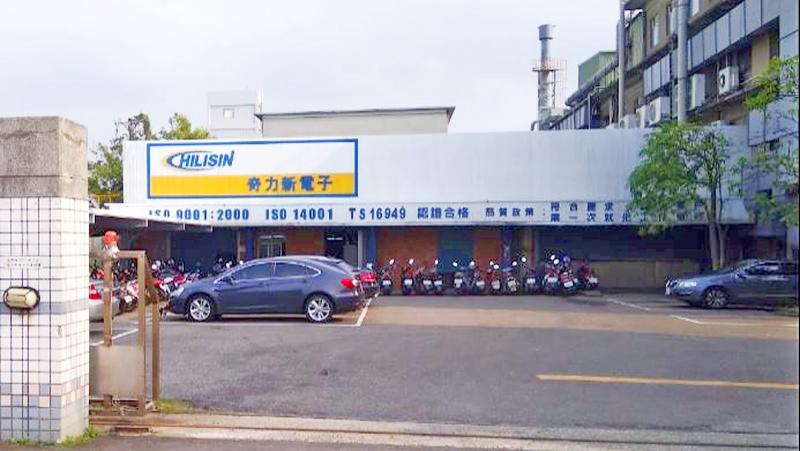Chilisin Electronics Corp (奇力新), the nation’s largest power inductor manufacturer, would continue to benefit from steady demand for inductor components due to the work-from-home economy, while high-margin molding chokes and low-temperature cofired ceramic (LTCC) components are expected to become new revenue drivers, analysts said.
The firm’s cumulative sales rose 9.56 percent year-on-year to NT$15.91 billion (US$558.1 billion) in the first 11 months of last year, as persistent demand for laptops, Chromebooks, smartphones, gaming devices and servers during the COVID-19 pandemic boosted Chilisin’s shipments of mini-molding chokes, high-frequency chip inductors and LTCC components.
The average consumption of LTCC components in 5G smartphones would increase to 10 to 15 units per phone, three times that required for 4G handsets, while the average consumption of inductors would increase from 120 to 180 for each mid-level smartphone and rise from 120 to 180 in high-end models, analysts said.

Photo: Chang Hui-wen, Taipei Times
However, Chilisin’s announcement last month that it would spin off chip resistor maker Ralec Electronic Corp (旺詮) and acquire networking transformer supplier Bothhand Enterprise Inc (帛漢) would result in the company’s revenue dropping about NT$2 billion this year, they said.
“Ralec has posted annual sales of about NT$4 billion, with gross margins of between 25 and 30 percent, while Bothhand has posted sales of NT$2 billion to NT$2.2 billion per year, with gross margin of between 30 and 35 percent,” Yuanta Securities Investment Consulting Co (元大投顧) analysts Calvin Wei (魏建發) and Samantha Chao (趙思涵) said in a research note on Dec. 25.
The deal — with Chilisin acquiring 100 percent shares of Bothhand for NT$2.8 billion — would hurt Chilisin’s revenue outlook in the short term but benefit its operations in the long term, they said.
The transaction is expected to be completed by the end of this month, Chilisin said on Dec. 23.
Yuanta has retained its “buy” rating on Chilisin with a target share price of NT$135, but forecast that the company’s revenue would decline 10 percent year-on-year this year and net income would drop 4 percent from last year.
Chilisin shares ended 2.61 percent lower at NT$112 on Thursday in Taipei trading, after closing out last year with an annual decline of 12.5 percent.

MULTIFACETED: A task force has analyzed possible scenarios and created responses to assist domestic industries in dealing with US tariffs, the economics minister said The Executive Yuan is tomorrow to announce countermeasures to US President Donald Trump’s planned reciprocal tariffs, although the details of the plan would not be made public until Monday next week, Minister of Economic Affairs J.W. Kuo (郭智輝) said yesterday. The Cabinet established an economic and trade task force in November last year to deal with US trade and tariff related issues, Kuo told reporters outside the legislature in Taipei. The task force has been analyzing and evaluating all kinds of scenarios to identify suitable responses and determine how best to assist domestic industries in managing the effects of Trump’s tariffs, he

TIGHT-LIPPED: UMC said it had no merger plans at the moment, after Nikkei Asia reported that the firm and GlobalFoundries were considering restarting merger talks United Microelectronics Corp (UMC, 聯電), the world’s No. 4 contract chipmaker, yesterday launched a new US$5 billion 12-inch chip factory in Singapore as part of its latest effort to diversify its manufacturing footprint amid growing geopolitical risks. The new factory, adjacent to UMC’s existing Singapore fab in the Pasir Res Wafer Fab Park, is scheduled to enter volume production next year, utilizing mature 22-nanometer and 28-nanometer process technologies, UMC said in a statement. The company plans to invest US$5 billion during the first phase of the new fab, which would have an installed capacity of 30,000 12-inch wafers per month, it said. The

Taiwan’s official purchasing managers’ index (PMI) last month rose 0.2 percentage points to 54.2, in a second consecutive month of expansion, thanks to front-loading demand intended to avoid potential US tariff hikes, the Chung-Hua Institution for Economic Research (CIER, 中華經濟研究院) said yesterday. While short-term demand appeared robust, uncertainties rose due to US President Donald Trump’s unpredictable trade policy, CIER president Lien Hsien-ming (連賢明) told a news conference in Taipei. Taiwan’s economy this year would be characterized by high-level fluctuations and the volatility would be wilder than most expect, Lien said Demand for electronics, particularly semiconductors, continues to benefit from US technology giants’ effort

In a small town in Paraguay, a showdown is brewing between traditional producers of yerba mate, a bitter herbal tea popular across South America, and miners of a shinier treasure: gold. A rush for the precious metal is pitting mate growers and indigenous groups against the expanding operations of small-scale miners who, until recently, were their neighbors, not nemeses. “They [the miners] have destroyed everything... The canals, springs, swamps,” said Vidal Britez, president of the Yerba Mate Producers’ Association of the town of Paso Yobai, about 210km east of capital Asuncion. “You can see the pollution from the dead fish.